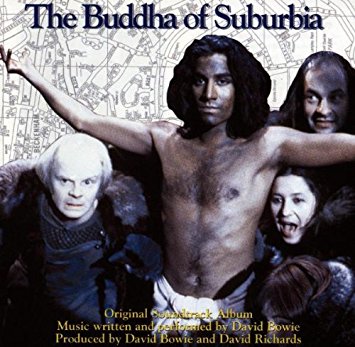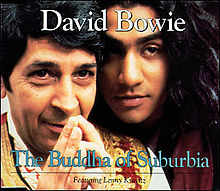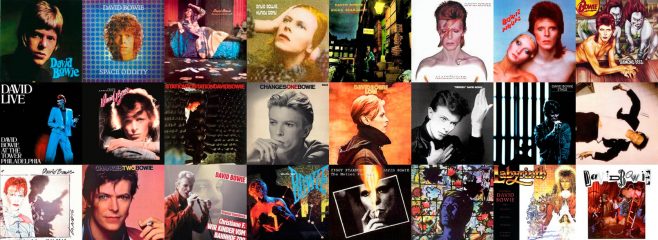
“The Buddha of Suburbia” is David Bowie’s 21st studio album (although it’s officially classed as a soundtrack) and was originally released on 8 November 1993.
When I finished the really difficult task of ranking all of Bowie’s studio albums, I was a little surprised (astonished even) that this album ended up being ranked so low. I really do like this album but in the end, the ranking is what it is. As I felt with “Let’s Dance“, it’s more a question of the other albums just being that little bit better rather than this necessarily being a particularly bad album.
“The Buddha of Suburbia” has a rather odd story in that in many ways it’s the album that fell through the cracks and many people didn’t even know existed until sometime later. Initially it was to be the soundtrack to the BBC2 4 part series “The Buddha of Suburbia”, adapted from the book by Hanif Kureishi. It tells the story of a somewhat mixed up, mixed-race 17 year old, growing up in South London during the 70s, searching for some spiritual meaning and purpose in his life. Weren’t we all !!
Bowie was attracted to the project in part that it’s based in the same location as where he grew up and featured a character called Charlie that is very loosely based on David Bowie’s glam-period persona. Knowing Bowie, he also probably really liked the book as well. So he agreed to do the soundtrack for the TV series.
In an incredible brief period of activity, he basically spent the best part of a week writing and recording the tracks along with his mate Erdal Kizilcay, who had worked on both Iggy Pop’s “Blah Blah Blah” and the “Never Let Me Down” albums. Both of them played the majority of the instruments, with special appearances here and there from the likes of Mike Garson and Lenny Kravitz. Note he also wrote all the tracks (no covers here) which is a rarity for a Bowie album, especially post “Lodger”.
However in the end, very little of what he recorded was actually used in the TV series (from memory, I think the title track was about it) although the TV series did feature some of Bowie’s back catalog. Most of the final tracks on the album were actually reworked versions from what he had originally intended or were more influenced by the book, rather than written specifically for the TV series. As such, it’s one of the most nostalgic albums he’s ever made, full of references to his past. In the album notes, Bowie wrote a piece on what his inspirations were and listed a whole bunch of “residue from the 1970’s” he wanted to capture. These included things as varied as Pink Floyd, Costume, Blues Clubs, Kraftwerk, Loneliness, Drugs, Prostitutes & Soho, Die Mauer and Bromley (my birthplace, yeah) to name a few.
But one thing it isn’t is a “soundtrack” album, not in the conventional sense of the word anyways. Even though it actually said “Original Soundtrack Album” on the cover, with the words “David Bowie” somewhat hidden away at the bottom.
But that was part of the problem, many considered this to be “just” a soundtrack, not even too sure how much of it was actually David Bowie, how much just some weird background music. To add to the confusion, the title track was released as a single and many thought that the single was it and that there wasn’t an accompanying album.
The record label then experienced financial issues and wasn’t able to promote it at all and it wasn’t even released in the US until a couple of years later due also to contractual issues. Having only recently released his “come back” solo album “Black Tie White Noise” earlier in the year, how could this really be another substantive David Bowie album?
So to Bowie’s undoubted frustration, the album barely got a murmur in the music press and become the new David Bowie album that nobody was looking for in the music shops. It was probably filed away in the soundtracks section and so impossible to find anyways. And if you did find it, you probably missed is was by David Bowie as his name is barely noticeably on the cover.
Which is all a shame really because despite my low ranking, “The Buddha of Suburbia” is actually a fine album with some great tracks that deserves much more recognition that it’s ever really received.
The album opens with the title track “Buddha of Suburbia“. It’s a great song that manages that wonderful mix of sounding both nostalgic and fresh at the same time. Bowie sounds great with lots of references to London and his past, especially with the “zane zane zane, ouvre le chien” refrain from “All The Madmen”. A great way to start the album.
The next track “Sex And The Church” has a repetitive, thumping, catchy groove with a distorted vocal, followed by the “sex and the church” refrain throughout. I think Bowie just liked saying “sex” a lot, but the track once it starts going doesn’t really go anywhere special. The little sax solo and sax background touches adds quite a nice touch.
“South Horizon” was Bowie’s favourite track on the album, but it’s actually my least. It has that piano jazz feel that I think Bowie has always quite liked but isn’t to my taste. It does though meet the mood of the album nicely, taking you to some little London jazz club with Bowie’s step-brother Terry in toe. The track is important in that it re-introduced Mike Garson on piano to his line-up, a key figure during the Ziggy period and up to Young Americans. Mike was to become an integral part of his band and sound from here on in.
The next piece “The Mysteries” is another moody instrumental, but this one takes you back to his Berlin-era, Eno inspired ambient sound. You wouldn’t play this on a dance floor, but with headphones on, it sounds soft and smooth and Zzzzzzzzzzzz…
“Bleed Like a Craze, Dad” wakes us up a bit with another catchy groove of a song, with Mike Garson again on piano, but this time much more in the background with the funky drums, bass and guitar of 3D Echo dominant. It’s a great little song.
“Strangers When We Meet” is a truly great song, but the version here is not quite as tight as the excellent version that closes the “1. Outside” album. The rhythm guitar sounds fantastic as do Bowie’s yearning vocals but it’s the lyrics that grab me here. Wonderful imagery of maybe an older Bowie grappling with meeting a younger, naive person, but you get the distinct impression that his favourite cut-up technique was used here.
“Dead Against It” has a keyboard driven riff that chugs along quite nicely. It fits the mood of the album, changing the musical pace but with Bowie’s vocals remaining soft and gentle.
“Untitled No. 1” is the undoubted highlight of the album. It’s a fabulous track, well worthy of any Top 50 Bowie song list. It’s beautifully atmospheric but with a wonderful melody and vocals that just take you to another place. At times he sings with lyrics that you can discern but not quiet understand, at other times they sound like something you think is there but not quite. There’s so much going on that you just want to hit the repeat to see if you can hear something new. I love this track !!
“Ian Fish U.K. Heir” is an ambient soundscape. There’s almost nothing going on but a slight wash of sound and a slow melodic “do do, do do”. You get the distinct feeling that Bowie is itching to work with Brian Eno again…
Finally, we end where we began, with another version of “Buddha of Suburbia“. It feels so long since we started that we need reminding again of how this journey all started. This is the only track that was released as a single, notably different from the other version by a guitar track by Lenny Kravitiz. I love the music video as well with Bowie wandering through the suburbia that is South London. I always wonder how close I lived as a child from where it was shot. Music Video.

The fact that he was back to experimenting musically again and wasn’t afraid to record and release something new super fast boded well for the future. If he could record something like this in a matter of days, imagine what he could achieve if he really put his time and energy into it.
His next album indeed featured much experimentation, Brian Eno and a much more focused and full hearted attempt to produce something special. And oh boy, did he succeed, but that’s a story for another day.
Best Tracks: Untitled No. 1, Strangers When We Meet, Buddha of Suburbia

Pingback: David Bowie Albums: My Reviews Ranked From Least to Most Favourite Album | Richard Foote's David Bowie Page
Pingback: 14. Blackstar | Richard Foote's David Bowie Page
Pingback: 6. The Man Who Sold The World | Richard Foote's David Bowie Blog
Pingback: 5. 1. Outside | Richard Foote's David Bowie Blog